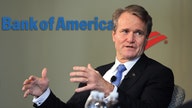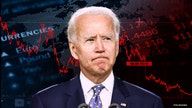The Biden administration’s proposal for a minimum corporate tax rate as part of its infrastructure plan could have unintended consequences, economists say.
The plan would require corporations to pay a minimum 15% tax rate no matter what deductions they take, and is similar to the alternative minimum tax on individuals.
The White House would be willing to temporarily delay its attempt to raise the top corporate tax rate to 28% from the 21% that was achieved under President Trump’s Tax Cuts and Jobs Act. The plan was already facing difficulty in Congress.
A global minimum corporate tax rate is a "safety net against the kind of loopholes that have pervaded our tax code that have been so beneficial to those at the top," Jared Bernstein, a member of the White House Council of Economic Advisers said on MSNBC on Friday.
BIDEN SUSPENDING ALASKA OIL, GAS LEASES GOES AGAINST REASON FOR STATEHOOD: GOV. DUNLEAVY
Treasury Secretary Janet Yellen attended a meeting in London with G7 finance ministers on Friday and Saturday and the group came together on a global minimum tax.
"The G7 has taken significant steps this weekend to end the existing harmful dynamic, making commitments today that provide tremendous momentum towards achieving a robust global minimum tax at a rate of at least 15%. That global minimum tax would end the race-to-the-bottom in corporate taxation and ensure fairness for the middle class and working people in the U.S. and around the world," said Yellen in her remarks at the meeting.

U.S. Treasury Secretary Janet Yellen and her Italian counterpart Daniel Franco pose together ahead of the G7 finance ministers meeting at Lancaster House in London, ahead of the G7 leaders' summit, Friday June 4, 2021. (Steve Reigate/Pool via AP)
The group agreed to back the 15% rate, British finance minister Rishi Sunak announced on Saturday.
The deal could benefit high-tax countries like Germany and France whose corporate tax rates are among the highest in the world at 30% and 26.5%, respectively.

Britain's Chancellor of the Exchequer Rishi Sunak, center, at a meeting of finance ministers from across the G7 nations at Lancaster House in London, Friday June 4, 2021. (Stefan Rousseau/Pool via AP / AP Newsroom)
Even with the agreement among G7 members, the plan must still be approved by Congress and is likely to face opposition from Republicans.
A spokesperson for Sen. Shelley Moore Capito, R-W.Va., said the senator and Biden participated in a phone conversation on Friday and continue to work on a bipartisan infrastructure package. They agreed to connect again on Monday.
Economists worry reaching an agreement will be difficult and that if achieved could boomerang on the U.S.
"Countries like Ireland are going to be an obstacle in getting a final deal," Greg Valliere, chief U.S. strategist at Toronto-based AGF Investments, which has nearly $39.5 billion in assets, told FOX Business.
GET FOX BUSINESS ON THE GO BY CLICKING HERE
Ireland’s 12.5% corporate tax rate has attracted 700 U.S. firms that employ more than 160,000 workers, according to the American Chamber of Commerce Ireland, a group representing U.S. companies with a mission to serve as their voice in Ireland and position Ireland as the choice for U.S. investment. The organization reports that current U.S. investment in the Emerald Isle totals $444 billion.
"Some foreign countries which are favorite locations for business may lower their tax rates even further," said Sri Kumar, chief economist and strategist at Santa Monica, California-based Sri Kumar Global Strategies. "That may cause a flight of capital away from the United States."



















